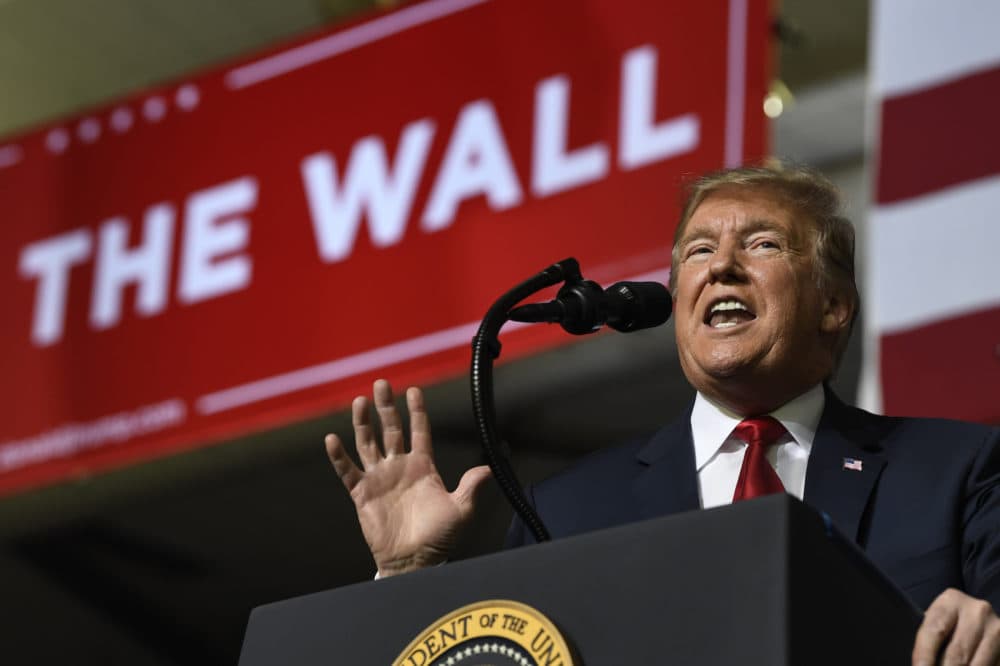Advertisement
Harvard Professor Delves Into 'How America Lost Its Mind' In Polarized Political Climate

America is in the midst of arguably the most polarized period in its history, with the divide between conservative and liberal; Republican and Democrat — perhaps as wide as it's ever been following the 2016 presidential election.
But as we lean further to the left or right — including in the way we consume news and social media content — one expert believes we're losing our ability to tell truth from lies.
Thomas Patterson is a professor at the Harvard Kennedy School and the author of the book "How America Lost Its Mind," and he joined us to talk about America's fight over the facts.
Here are excerpts from the interview, lightly edited for clarity.
Highlights
On the problem of a misinformed public
The level of misinformation is rampant on issue after issue, [on] everything from climate change to immigration to childhood vaccines. There are tens of millions of Americans who have ideas about the facts that are wildly at odds with the facts. And that's a real problem because it makes it very difficult, I think, for society to deal with its problems if people have very different alternative versions of what those problems are.
On the role of news in spreading misinformation
When I was growing up, to get the news you looked at your local newspaper and the three broadcast networks. But today, it comes at you from a lot of different directions, and some of it's not reliable. We eliminated the Fairness Doctrine in 1987, and that brought us partisan talk radio. And those shows today have a weekly audience in excess of 40 million people. There are thousands of websites that deal with politics. Very few of them try to deal with reasoned discourse. And increasingly, Americans are taking sides — with Republicans, since Trump has been in office, being even less trusting of the media, and Democrats more trusting.
On Donald Trump and "fake news"
Donald Trump is almost kind of president unto himself. We've never had a president like this before. He lies with abandon, almost to the point where you fear that lying is becoming normalized in American politics. I think what surprised a lot of Republicans is the degree to which he's been able to kind of capture the Republican base. That's made it difficult, I think, for other Republicans in office to counter some of these claims. The importance of politics based on reality, on truth — I think Trump has denigrated that.
The impeachment inquiry is a good example of that. We have all sorts of evidence from the intelligence communities that Russians were involved in hacking the [Democratic National Committee]. Now we're seeing this alternative narrative about Ukraine actually being the culprit in this instance. You can see in polls that it's starting to get some traction. The ability to trust each other depends on this sense that you're being told the truth. And when that begins to erode, then other parts of democracy erode. And I do think it opens the door to demagoguery.
Advertisement
On how America can recover its ability to reason
I do think we've got to kind of restore the center in Congress. I think the news media have to step up. They're a megaphone for much of this misinformation. And then I think the platforms have to step up. One of the more interesting things about fake news, for example, is that we like it. It travels social media about six times faster than actual news. There are more than a billion sites out there. And the idea that they can kind of easily separate the fact and the fake in social media, I think, is an illusion. But they could do more.
Facts are places where we start to negotiate differences. And if we can't agree on the facts, then we have no starting point.
On whether people will dismiss his criticism of Donald Trump as partisan
For nearly every example that I give of Republicans deluding themselves, I give an example of Democrats deluding themselves. Nobel laureate Daniel Kahneman said, "we have enormous capacity to ignore our own ignorance." When we're listening to our side, we can sit there for an hour and think that everything that we've heard is true. We spend an hour looking at what's happening on the other side, and we think almost nothing is true. And that's true of Republicans and Democrats alike. I don't think this problem of misinformation is a partisan issue. I think it's an American issue.
This segment aired on November 26, 2019.

